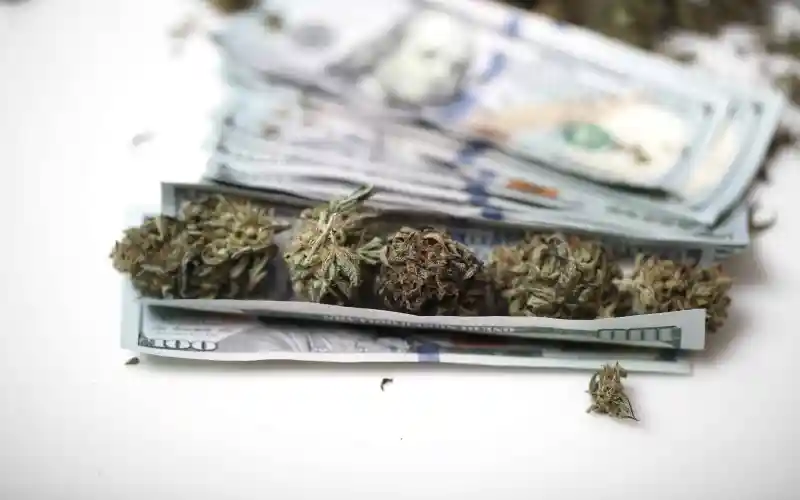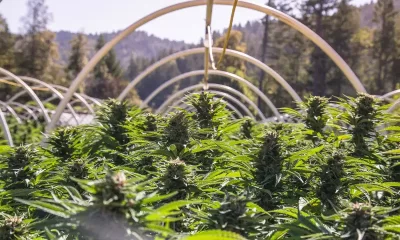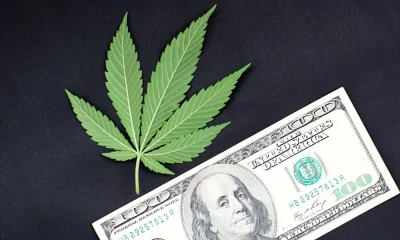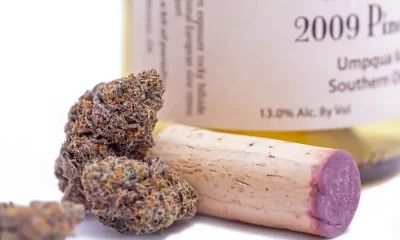Business
Cannabis Industry Paid $1.8 Billion in Excess Taxes in 2022

Excess taxes are expected to increase in 2023.
According to data from the cannabis research firm Whitney Economics, the cannabis industry paid an excess of $1.8 billion in additional taxes in 2022 alone. And, spoiler alert: This article doesn’t have a happy ending. Cision PR Newsletter reports that this number is expected to jump to $2.1 billion in 2023.
As High Times continuously writes, with deep frustration, so far, the legal cannabis industry has largely not succeeded in creating an accessible business model. California, among other states, is seeing a mass exodus as legal cannabis companies, such as Jerry Garcia’s legacy brand, leave the state due to exorbitantly high taxes and red tape. Despite ongoing efforts to help communities most impacted by the War on Drugs enter the legal market, if celebrity brands can’t make a profit, how is one starting life after the financial and mental turmoil of going to prison for a non-violent cannabis offense supposed to make a decent living?
So why are the taxes so damn high for cannabis businesses? Don’t forget that your pretty pre-rolls and vegan edibles are technically still a Schedule I substance, meaning that, according to the Feds, cannabis has “no currently accepted medical use and a high potential for abuse.” This is scientifically inaccurate and regressive, not to mention hypocritical, as 38 states and Washington D.C. currently have medical marijuana programs. The taxes inflicted on folks in the legal market indicate that legalization is not the utopia we hoped for and may help the black market, which continues to flourish. Overtaxing legal cannabis companies is not only harmful to business owners, but it raises prices and thus isolates potential clients.
Cannabis companies are subject to the federal tax provision 280E, which “penalizes traffickers of Schedule I or II drugs by disallowing the deduction of “ordinary and necessary” business expenses—such as below-the-line deductions—after reducing gross receipts by the cost of goods sold, or COGS, essentially resulting in federal income tax liability calculated based on gross income, not net income,” according to Bloomberg Tax.
If you pour the stress of 280E on top of other cannabis business hurdles, such as difficulty accessing banking services and regulations against any interstate commerce, the result is that for many companies, it’s impossible to make a profit in the legal cannabis biz. The effective tax rates are often higher than 70% for cannabis retailers.
As Cision PR Newsletter reports, as a result, 24.4% of cannabis operators surveyed indicated that they are profitable. And things are becoming more dire last year; the figure was 42%. And, while it’s tempting to blame a post-pandemic economy, other industries are actually flourishing. According to Bloomberg, in 2022, U.S. corporate profits saw the largest margins since the 1950s.
As warned earlier in this article, don’t expect the legal market to have a breakthrough and get better anytime soon. Whitney Economics is releasing a survey later this month stating that cannabis businesses are hanging on by the skin of their teeth and should not expect a positive shift in the immediate future.
“The cannabis industry is under extreme economic distress, and the current regulatory and taxation environment is untenable, even in the short term,” says Beau Whitney, chief economist at Whitney Economics, according to a press release. He adds that many state markets are on “the brink of systemic collapse.” The report suggests that tax reform is the only answer to the problem. Under the right tax laws, the cannabis industry could be bringing in billions—and not just for the government to collect in taxes. Whitney Economics predicts that with the proper reform of 280E and cannabis policy, industry employment will increase, and economic activity will rise by $35.2 billion over ten years.
Reuters reports that three Senate Democrats introduced a bill to remove cannabis from the Controlled Substances Act in July of 2022, thus nullifying Code Sec. 280E. The Cannabis Administration and Opportunity Act would impose a top excise tax of 25% on products sold by large cannabis businesses. At time of reporting, it is still pending.
Source: https://hightimes.com/news/cannabis-industry-paid-1-8-billion-in-excess-taxes-in-2022/
Business
New Mexico cannabis operator fined, loses license for alleged BioTrack fraud

New Mexico regulators fined a cannabis operator nearly $300,000 and revoked its license after the company allegedly created fake reports in the state’s traceability software.
The New Mexico Cannabis Control Division (CCD) accused marijuana manufacturer and retailer Golden Roots of 11 violations, according to Albuquerque Business First.
Golden Roots operates the The Cannabis Revolution Dispensary.
The majority of the violations are related to the Albuquerque company’s improper use of BioTrack, which has been New Mexico’s track-and-trace vendor since 2015.
The CCD alleges Golden Roots reported marijuana production only two months after it had received its vertically integrated license, according to Albuquerque Business First.
Because cannabis takes longer than two months to be cultivated, the CCD was suspicious of the report.
After inspecting the company’s premises, the CCD alleged Golden Roots reported cultivation, transportation and sales in BioTrack but wasn’t able to provide officers who inspected the site evidence that the operator was cultivating cannabis.
In April, the CCD revoked Golden Roots’ license and issued a $10,000 fine, according to the news outlet.
The company requested a hearing, which the regulator scheduled for Sept. 1.
At the hearing, the CCD testified that the company’s dried-cannabis weights in BioTrack were suspicious because they didn’t seem to accurately reflect how much weight marijuana loses as it dries.
Company employees also poorly accounted for why they were making adjustments in the system of up to 24 pounds of cannabis, making comments such as “bad” or “mistake” in the software, Albuquerque Business First reported.
Golden Roots was fined $298,972.05 – the amount regulators allege the company made selling products that weren’t properly accounted for in BioTrack.
The CCD has been cracking down on cannabis operators accused of selling products procured from out-of-state or not grown legally:
- Regulators alleged in August that Albuquerque dispensary Sawmill Sweet Leaf sold out-of-state products and didn’t have a license for extraction.
- Paradise Exotics Distro lost its license in July after regulators alleged the company sold products made in California.
Golden Roots was the first alleged rulebreaker in New Mexico to be asked to pay a large fine.
Source: https://mjbizdaily.com/new-mexico-cannabis-operator-fined-loses-license-for-alleged-biotrack-fraud/
Business
Marijuana companies suing US attorney general in federal prohibition challenge

Four marijuana companies, including a multistate operator, have filed a lawsuit against U.S. Attorney General Merrick Garland in which they allege the federal MJ prohibition under the Controlled Substances Act is no longer constitutional.
According to the complaint, filed Thursday in U.S. District Court in Massachusetts, retailer Canna Provisions, Treevit delivery service CEO Gyasi Sellers, cultivator Wiseacre Farm and MSO Verano Holdings Corp. are all harmed by “the federal government’s unconstitutional ban on cultivating, manufacturing, distributing, or possessing intrastate marijuana.”
Verano is headquartered in Chicago but has operations in Massachusetts; the other three operators are based in Massachusetts.
The lawsuit seeks a ruling that the “Controlled Substances Act is unconstitutional as applied to the intrastate cultivation, manufacture, possession, and distribution of marijuana pursuant to state law.”
The companies want the case to go before the U.S. Supreme Court.
They hired prominent law firm Boies Schiller Flexner to represent them.
The New York-based firm’s principal is David Boies, whose former clients include Microsoft, former presidential candidate Al Gore and Elizabeth Holmes’ disgraced startup Theranos.
Similar challenges to the federal Controlled Substances Act (CSA) have failed.
One such challenge led to a landmark Supreme Court decision in 2005.
In Gonzalez vs. Raich, the highest court in the United States ruled in a 6-3 decision that the commerce clause of the U.S. Constitution gave Congress the power to outlaw marijuana federally, even though state laws allow the cultivation and sale of cannabis.
In the 18 years since that ruling, 23 states and the District of Columbia have legalized adult-use marijuana and the federal government has allowed a multibillion-dollar cannabis industry to thrive.
Since both Congress and the U.S. Department of Justice, currently headed by Garland, have declined to intervene in state-licensed marijuana markets, the key facts that led to the Supreme Court’s 2005 ruling “no longer apply,” Boies said in a statement Thursday.
“The Supreme Court has since made clear that the federal government lacks the authority to regulate purely intrastate commerce,” Boies said.
“Moreover, the facts on which those precedents are based are no longer true.”
Verano President Darren Weiss said in a statement the company is “prepared to bring this case all the way to the Supreme Court in order to align federal law with how Congress has acted for years.”
While the Biden administration’s push to reschedule marijuana would help solve marijuana operators’ federal tax woes, neither rescheduling nor modest Congressional reforms such as the SAFER Banking Act “solve the fundamental issue,” Weiss added.
“The application of the CSA to lawful state-run cannabis business is an unconstitutional overreach on state sovereignty that has led to decades of harm, failed businesses, lost jobs, and unsafe working conditions.”
Business
Alabama to make another attempt Dec. 1 to award medical cannabis licenses

Alabama regulators are targeting Dec. 1 to award the first batch of medical cannabis business licenses after the agency’s first two attempts were scrapped because of scoring errors and litigation.
The first licenses will be awarded to individual cultivators, delivery providers, processors, dispensaries and state testing labs, according to the Alabama Medical Cannabis Commission (AMCC).
Then, on Dec. 12, the AMCC will award licenses for vertically integrated operations, a designation set primarily for multistate operators.
Licenses are expected to be handed out 28 days after they have been awarded, so MMJ production could begin in early January, according to the Alabama Daily News.
That means MMJ products could be available for patients around early March, an AMCC spokesperson told the media outlet.
Regulators initially awarded 21 business licenses in June, only to void them after applicants alleged inconsistencies with how the applications were scored.
Then, in August, the state awarded 24 different licenses – 19 went to June recipients – only to reverse themselves again and scratch those licenses after spurned applicants filed lawsuits.
A state judge dismissed a lawsuit filed by Chicago-based MSO Verano Holdings Corp., but another lawsuit is pending.
Source: https://mjbizdaily.com/alabama-plans-to-award-medical-cannabis-licenses-dec-1/
-

 Business2 years ago
Business2 years agoPot Odor Does Not Justify Probable Cause for Vehicle Searches, Minnesota Court Affirms
-

 Business2 years ago
Business2 years agoNew Mexico cannabis operator fined, loses license for alleged BioTrack fraud
-

 Business2 years ago
Business2 years agoAlabama to make another attempt Dec. 1 to award medical cannabis licenses
-

 Business2 years ago
Business2 years agoWashington State Pays Out $9.4 Million in Refunds Relating to Drug Convictions
-

 Business2 years ago
Business2 years agoMarijuana companies suing US attorney general in federal prohibition challenge
-

 Business2 years ago
Business2 years agoLegal Marijuana Handed A Nothing Burger From NY State
-

 Business2 years ago
Business2 years agoCan Cannabis Help Seasonal Depression
-

 Blogs2 years ago
Blogs2 years agoCannabis Art Is Flourishing On Etsy













